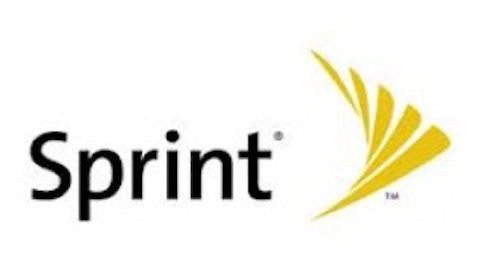Investors need to be careful about assuming trends that happened in the past will continue in the future. I recently noticed Verizon Communications Inc. (NYSE:VZ)’s yield drop below 4%, and thought that the stock might have run too far, too fast. In prior years, I was used to seeing Verizon’s yield at around 4% or more. My gut instinct told me that with a lower yield, investors might not be as attracted to the stock. However, after researching the company’s recent earnings, nothing could be further from the truth.
The beat goes on
It seems like anytime AT&T Inc. (NYSE:T) begins to gain an edge on Verizon Communications Inc. (NYSE:VZ), the latter comes out with earnings that are just better in every way. In recent months, I noticed that AT&T was buying back relatively more shares than Verizon, and the company’s yield was higher. However, looking at each company’s earnings, there is little question that Verizon is performing better.
There has also been a lot of talk about Sprint Nextel Corporation (NYSE:S) being bought by Softbank or DISH Network Corp. (NASDAQ:DISH). However, no matter what happens, Sprint isn’t playing in the same league as even AT&T Inc. (NYSE:T). Last but not least, we have T MOBILE US INC (NYSE:TMUS), trying to take the third spot from Sprint. The combination of roughly 9 million Metro PCS customers and about 43 million T-Mobile users makes the company more competitive, but they can’t match Verizon Communications Inc. (NYSE:VZ)’s performance either.
A high margin business
The first reason investors should consider the stock is, Verizon has the best operating margin in the wireless business. In the current quarter, Verizon Communications Inc. (NYSE:VZ)’s wireless operating margin was 32.9%, solidly ahead of AT&T Inc. (NYSE:T) at 28%. Considering that Sprint Nextel Corporation (NYSE:S)’s wireless margin was essentially zero, and T-Mobile managed about 8.38%, you can see the gap in performance between these companies.

Customers are voting with their loyalty
A second reason that Verizon Communications Inc. (NYSE:VZ) is the best comes from its customers. Verizon has routinely had the lowest postpaid wireless churn in the business. Since Sprint Nextel Corporation (NYSE:S) and T-Mobile have many more pre-paid subscribers, their churn is higher and creates an unfair comparison. That being said, Sprint’s postpaid churn rate was 2.09% in the last quarter, and T-Mobile’s churn rate as of late last year was 2.3%.
By comparison, AT&T Inc. (NYSE:T) reported postpaid churn of 1.04%, but Verizon did even better, with postpaid churn of 1.01%. Since Verizon has consistently beat their peers in this area, it seems clear that once a customer switches to Verizon, they don’t leave.
Why would you go against the flow?
Some investors have been unimpressed with Verizon’s earnings, and think that the stock is too expensive. However, those looking at Verizon Communications Inc. (NYSE:VZ)’s net income are missing the point completely. Verizon, like its peers, has a huge amortization and depreciation allowance. This means that net income only tells a part of the cash flow story.
Verizon’s operating cash flow growth is the third reason the stock looks attractive. When looking at cash flow, I eliminate much of the accounting changes and just use what I call core operating cash flow (net income + depreciation). Using this calculation, Verizon stands head and shoulders above their peers. The company grew core operating cash flow by 13.1% on a year-over-year basis, compared to growth of just 1.1% at AT&T Inc. (NYSE:T). Sprint Nextel Corporation (NYSE:S)’s core operating cash flow grew by 5.73%, and T-Mobile’s results are skewed because of the Metro PCS deal.
The safety of Verizon’s dividend is the fourth reason the stock should do well. Since neither Sprint Nextel Corporation (NYSE:S) nor T-Mobile pay a dividend, we can eliminate them immediately. Looking at core free cash flow (net income + depreciation – capital expenditures), we see that AT&T’s free cash flow payout ratio was 61.78% last quarter. Given that Verizon’s free cash flow payout was just 27.41% using this same metric, I don’t see why investors would worry about Verizon Communications Inc. (NYSE:VZ)’s slightly lower yield.
Don’t trust your gut, do the research
The bottom line is, if I trusted my gut instinct and sold Verizon because I thought the stock had risen to fast, I would have been wrong. Even today the shares yield nearly 4% compared to about 4.8% at AT&T Inc. (NYSE:T). The difference is in these two companies growth rates. Analysts are expecting 9.25% EPS growth from Verizon in the next few years, versus just 5.35% from AT&T.
Though Sprint’s market position may improve with either a Softbank or DISH Network Corp. (NASDAQ:DISH) investment, they will still be playing catch-up to AT&T and Verizon. Where T-Mobile is concerned, they are essentially in the same position as Sprint. The bottom line is, if you want a market leader, with significant free cash flow, and an attractive yield, Verizon is still the best in its industry.
Chad Henage owns shares of Verizon Communications. The Motley Fool has no position in any of the stocks mentioned.
The article 4 Reasons the Run in This Stock Should Continue originally appeared on Fool.com.
Copyright © 1995 – 2013 The Motley Fool, LLC. All rights reserved. The Motley Fool has a disclosure policy.
